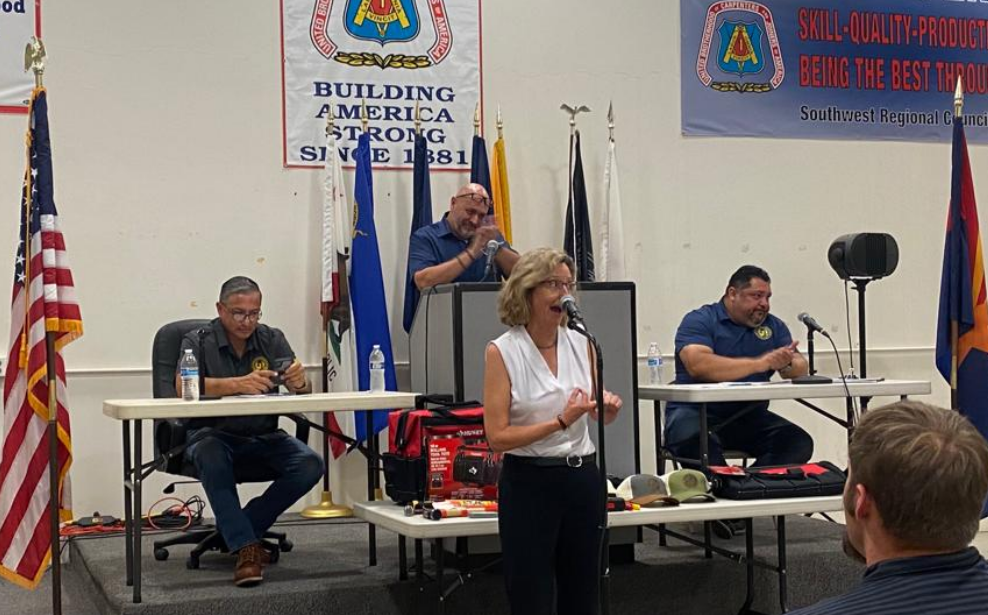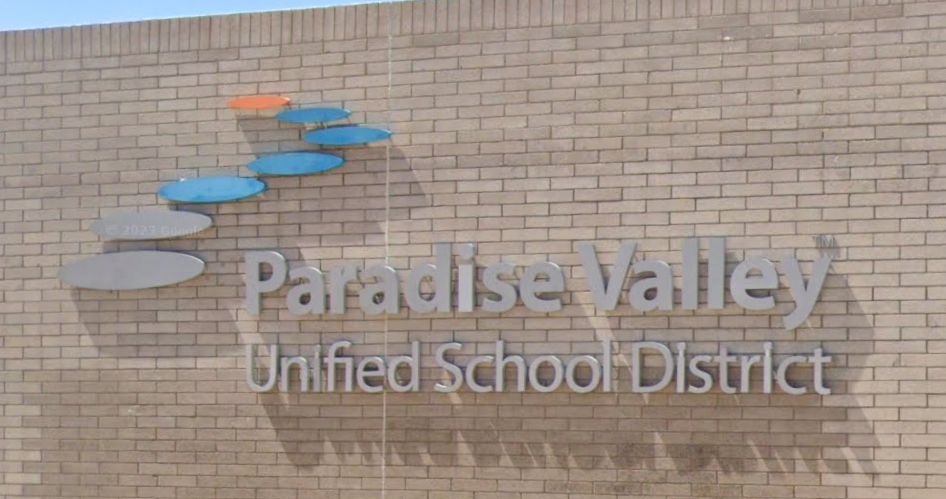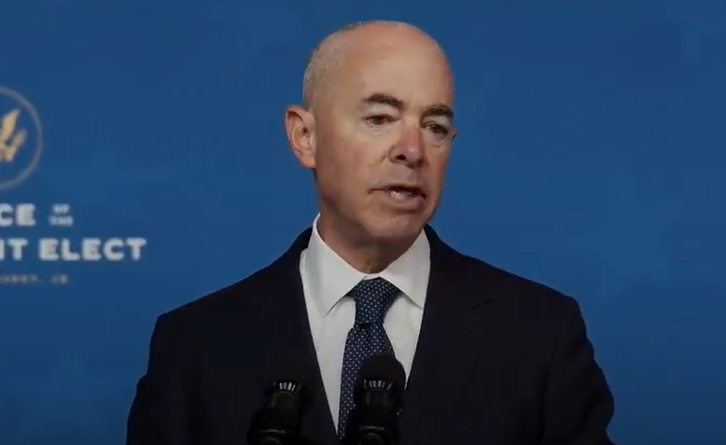
by Corinne Murdock | Feb 9, 2024 | News
By Corinne Murdock |
A vote by the Arizona Corporation Commission (ACC) earlier this week moved to limit energy companies’ push to meet Environmental, Social, Governance (ESG) goals.
The ACC voted 4-1 on Tuesday to draft rules to repeal existing rules and mandates for renewable energy as well as electric and gas energy efficiency: the Renewable Energy Standard and Tariff (REST) Rules and the Energy Efficiency Standards (EE), also known as the Demand Side Management (DSM). Per the commission, the rules and mandates for REST and EE/DSM resulted in incentives for renewable energy projects and services, since utilities were required to file proposals describing REST compliance.
Commissioner Ana Tovar was the sole “no” vote on the motions. The standards behind EE/DSM expired in 2020, but previous commissions didn’t repeal the rule.
The commission noted in Wednesday and Thursday press releases that the rules, tracing back to 2006 for REST and 2010 for EE/DSM, have cost customers nearly $3.4 billion through corresponding surcharges. REST surcharges have cost ratepayers nearly $2.3 billion, while EE/DSM surcharges cost nearly $1.1 billion.
Commissioner Nick Myers said in Wednesday’s press release that the rules and mandates were unnecessary and would result in a drastic cost increase to consumers.
“I believe it is time for the Commission to consider repealing these rules and mandates that appear to unnecessarily drive-up costs,” said Myers. “Utilities should select the most cost-effective energy mix to provide reliable and affordable service, without being constrained by government-imposed mandates that make it more expensive for their customers.”
In Thursday’s press release, Chairman Jim O’Connor — who filed the motion to repeal REST — said that the commissioners from nearly 20 years ago were “well-intentioned” in their vision for reducing the state’s carbon footprint through the REST rules, but that no cost controls were ever implemented, at the detriment of ratepayers.
“In 2006 when the REST rules supplanted the EPS rule, concerns by the dissenting Commissioner cited the lack of cost control measure that would negatively impact ratepayers, and the then-Chairman Hatch-Miller intended that the Commission review annually whether it was in the best interest of the ratepayers. Those reviews never occurred and costs were never considered,” said O’Connor.
O’Connor further remarked that contracts in pursuit of environmental mandates ultimately burdened the ratepayers.
“We began the steps needed to repeal a rule that has cost ratepayers billions of dollars in out of market priced contracts,” said O’Connor. “Mandates distort market signals and are not protective of ratepayers.”
Commissioner Kevin Thompson — who filed the motion to repeal EE/DSM — stated in the press release that the repeal marked a victory for ratepayers, and the end of “feel-good programs” that lack affordability and reliability.
“Arizona utilities have collected over a billion dollars in ratepayer surcharges for efficiency initiatives that have done little to avoid the need for new generation and have benefitted a select few,” said Thompson. “Energy efficiency programs are routinely pushed by vocal special interest groups where the economic benefits favor a small group of customers, and the large majority of ratepayers foot the bill.”
Prior to the ACC acting on the draft rules, the commission will open up multiple public comment opportunities. The draft rules and intake for public comment will be located on the following ACC dockets: gas utility energy efficiency, electric utility energy efficiency, and renewable energy.
The entire rulemaking process will take over a year, according to commission staff. The REST and EE/DSM repeal are part of a greater, five-year review of existing ACC rule packages.
Corinne Murdock is a reporter for AZ Free News. Follow her latest on Twitter, or email tips to corinne@azfreenews.com.

by Corinne Murdock | Feb 9, 2024 | News
By Corinne Murdock |
Congressional candidate Kirsten Engel has kept quiet on the ongoing conflict over the border crisis and accountability for Biden administration leadership.
Engel hasn’t addressed the recent actions on the $118 billion border bill, nor did she respond to an AZ Free News inquiry concerning the attempted impeachment of Department of Homeland Security (DHS) Secretary Alejandro Mayorkas.
Following the House rejection of a motion to impeach Mayorkas, Senate Republicans blocked the border bill from advancing on Wednesday. House GOP leadership say that they will make another attempt at impeaching Mayorkas.
As reported earlier this week, a majority of the funding in the bill goes to Ukraine: $60 billion, compared to $20 billion for the border. The remainder of the funds were apportioned for humanitarian aid, overseas projects, the Indo-Pacific, and the Red Sea conflict.
This week, Engel opted to issue public remarks only on her attendance at an annual Democratic dinner.
During her last run in 2022, Engel sided with a more lenient approach to border security that included the end of Title 42 and rejection of the characterization of the state of the border as a crisis.
It appears that Engel’s campaign has remained similar on the issues this time around. Her approach to the border crisis includes the Biden administration mantra of “secure, fair, orderly, and humane” with a focus on increasing pathways to citizenship, and ignores the illegal migration outside the legal ports of entry, rather focusing on increasing resources at those legal ports of entry.
In December, Engel told voters that border security efforts should be focused on legal ports of entry to mitigate drug and human trafficking.
Engel last addressed the border bill, indirectly, last month. She leveled criticism against her opponent for supporting House GOP leadership’s stance that the border bill wasn’t a valid solution to the ongoing crisis.
“This is further proof that Republicans want to play politics with this issue, rather than solve it,” said Engel.
Engel also blamed Republicans in December for the ever-worsening border crisis, and the then-shutdown of the Lukeville Port of Entry. The closure was roundly condemned by both Democratic and Republican leadership. The Biden administration shuttered the port to reassign agents elsewhere along the border to process illegal immigrants.
“The situation at the border is getting worse by the day. One port of entry has already been shut down, tens of thousands of asylum-seekers have nowhere to go, and our border communities have been left to deal with the situation on their own,” said Engel. “People are tired of dysfunction in Congress and they know who to blame: Juan Ciscomani and Congressional Republicans.”
In September, Engel expressed frustration that illegal immigrants were deposited into communities due to full processing facilities, calling the practice “callous” and “dangerous.” Engel blamed Washington lawmakers for the nonstop inundation of illegal immigrants.
“This type of callous treatment by CBE of our border communities and migrants is as alarming as it is dangerous,” said Engel. “We’re reminded nearly everyday of just how badly Washington has failed us at the border.”
Corinne Murdock is a reporter for AZ Free News. Follow her latest on Twitter, or email tips to corinne@azfreenews.com.

by Corinne Murdock | Feb 8, 2024 | Education, News
By Corinne Murdock |
A Paradise Valley Unified School District (PVUSD) governing board member is alleging the district violated open meeting law to determine school closures and redraw boundary lines.
In a letter to the Arizona Attorney General on Tuesday, PVUSD Governing Board Member Sandra Christensen accused district leadership of violating state open meeting law with several secretive committees that she says didn’t function to advise the superintendent as purported but had, in fact, functioned to deliver policy recommendations to the governing board. Christensen urged prompt action from the attorney general, citing a potential upcoming vote on Thursday to shut down and redraw boundaries for certain schools based on recommendations from at least one of these committees.
Specifically, Christensen brought up the School Closure and Boundary Review Committee, which conducted seven meetings from last April through November, all closed to the public and originally absent any agendas or meeting minutes. The committee consisted of some community members, including PVUSD teachers, support staff, administrators, central office administrators, and parents, and was led by assistant superintendents Jill Baragan and Steve Jerras.
Christensen expressed concern that the district used this committee to deliberately hide “controversial” discussions on school closures and boundary changes not only from the public, but the governing board itself.
“The Paradise Valley Unified School District must cease these unlawful practices,” said Christensen. “These practices are clearly intended to avoid public scrutiny by refusing to allow members of the public to attend said meetings and refusing to supply detailed meeting minutes to the PVUSD governing board or members of the public.”
Christensen said that the committee meetings yielded recommendations for the governing board regarding the potential closures of four schools and boundary changes to 12 schools, on which the board took action in December by scheduling a public hearing last month. Christensen was the only board member to oppose the recommendations, under concern that the committee had violated open meeting law.
“It is clear that the team is designed to advise the board regarding matters on only the governing board can make such as the recommendation of school closures,” said Christensen.
The School Closure and Boundary Review Committee wasn’t the only committee formed over the years in violation of open meeting law, according to Christensen.
“The Paradise Valley Unified School District has a history of these types of violations under the guise of superintendent committees that are not administrative in nature, they are advisory committees to the board that deliberately circumvent Open Meeting Law to shield controversial topics or information from the public,” said Christensen.
Christensen cited another superintendent advisory committee, a bond committee, which met from last January through April to craft recommendations on a bond, as well as a “secretive,” ongoing community legislative network, which Christensen said has met “for many years” to discuss legislative bills with a lobbyist.
According to Christensen, PVUSD Superintendent Troy Bales denies that the committees have ever been more than administrative in nature.
Corinne Murdock is a reporter for AZ Free News. Follow her latest on Twitter, or email tips to corinne@azfreenews.com.

by Corinne Murdock | Feb 7, 2024 | News
By Corinne Murdock |
Reps. Andy Biggs (R-05) and Eli Crane (R-02), along with other House Republicans, failed to convince their colleagues to impeach Department of Homeland Security (DHS) Secretary Alejandro Mayorkas over his handling of the border crisis.
Biggs asserted that Mayorkas was in violation of the separation of powers, citing the secretary’s inaction on the removal of over one million illegal immigrants eligible for deportation, and neglect of Title 8.
“That has resulted in great injury to our communities, and that is why he must be impeached, because he falls within the definition of one of the Founders, James Iredell said, and he’s right on the money,” said Biggs.
Despite the number of illegal immigrant crossings and drug trafficking reaching unprecedented record highs under President Joe Biden, Mayorkas has maintained that the border crisis originated from decades of congressional inaction rather than the policy of this current administration.
Mayorkas and other Democratic leaders support the $118 billion Senate bill described as a border bill, though a majority of the funding goes to Ukraine and other countries.
Lawmakers opposed to the bill pointed out its increased leniency for illegal immigration, such as a provision allowing those who either make it over 100 miles or remain longer than 14 days in the country to avoid deportation. The bill also would create a new, nonimmigrant visa subcategory enabling noncitizens to visit family members, as well as removing illegal immigrants from countries other than Mexico or Canada out of total encounters.
The bill also included another $60 billion for Ukraine, while providing just over $20 billion for the border, over $14 billion for Israel, $10 billion in humanitarian aid, over $6 billion for a variety of over projects, nearly $5 billion for the Indo-Pacific, and over $2 billion for the Red Sea conflict.
President Joe Biden claimed the bill wasn’t perfect: not because it didn’t close the border more for illegal immigration, but because it didn’t go far enough to grant citizenship for those illegal immigrants within the country.
Some lawmakers have argued that Mayorkas would ignore limited enforcement measures passed.
During Tuesday’s debate on Mayorkas’ impeachment, Crane accused the secretary of that very inaction on immigration enforcement.
“How many Americans have to die of fentanyl, MS-13 gang members, having their kids raped and murdered?” asked Crane. “It’s high time that [Mayorkas] be held accountable for his complete dereliction of duty at our southern border.”
Rep. Greg Stanton (D-04), in a joint statement with the New Democrat Coalition (NDC), called the impeachment a “sham,” and blamed Republicans for the state of the border.
Three Republicans — Reps. Ken Buck (CO), Mike Gallagher (WI), and Tom McClintock (CA) — joined Democrats in defeating the impeachment measure, 214-216.
However, House GOP leadership say that Tuesday’s vote wouldn’t be the last attempt at impeaching Mayorkas. A spokesman for House Speaker Mike Johnson (LA) said he plans to whip more votes.
Corinne Murdock is a reporter for AZ Free News. Follow her latest on Twitter, or email tips to corinne@azfreenews.com.

by Corinne Murdock | Feb 7, 2024 | News
By Corinne Murdock |
In a race against Thursday’s deadline to prevent a potential conflict between state law and the federal election calendar deadline, Republican lawmakers have advanced a proposed set of bills while Democrats have balked. It’s unlikely the bills will become law, however, as Gov. Katie Hobbs quickly rejected them as “dead on arrival.”
Republican lawmakers from both the House and Senate announced their proposed solution, two bills, on Monday afternoon; by Tuesday morning, a joint committee had advanced the bills.
In a press release, the lawmakers said that the pair of bills, SB1733 and HB2785, would provide counties with an additional 19 days in the primary election calendar and an extra 17 days in the general election calendar to comply with federal deadlines.
State Sen. Wendy Rogers (R-LD07), chair of the Senate Elections Committee, expressed hope that Hobbs would sign the legislation if passed, claiming that a refusal would cause election turmoil and voter disenfranchisement. However, Hobbs dismissed the proposal almost immediately after its release.
“This commonsense solution promises to strengthen voter confidence, is backed by all Arizona county recorders, and allows our men and women who are serving in our armed forces overseas the opportunity to cast a ballot in our elections,” said Rogers.
HB2785 sponsor State Rep. Alexander Kolodin (R-LD03) remarked that it was “highly unlikely” the feared calendar conflict would come to fruition, and that the solution was “more complicated” than some other, unnamed solutions.
“There were many simpler ways to solve this problem, some of which do not require legislative solutions,” said Kolodin. “Nevertheless, we negotiated in good faith and agreed to accept this more complicated solution in exchange for signature verification and several other commonsense reforms.”
The solution aligns with recent requests by election officials, including that of Maricopa County Supervisor Bill Gates over the weekend.
On Tuesday, both SB1733 and HB2785 passed quickly and narrowly out of a special joint meeting with the Senate Committee on Elections and the House Elections Committee. Democrats uniformly opposed the bills, while all Republicans voted for them.
Arizona House Democrats described the bills as “a Christmas tree of unrelated and controversial policy provisions” that they and, likely, Hobbs would oppose.
Arizona Senate Democrats claimed that the alleged excess provisions in the proposed legislation would disenfranchise voters and hinder ballot access.
In a joint statement issued over the weekend, Hobbs and Secretary of State Adrian Fontes clarified that the governor wouldn’t approve any bill that carried “harmful unrelated legislation.”
The contested provisions include the imposition of the state’s first signature verification standards, as well as the expansion of signature curing hours to the weekend before and after an election for those elections including federal offices.
The proposed legislation would also create a category of verified early ballots exempt from review for voters who show ID when turning in their mailed early ballot in person.
The Arizona Association of Counties gave their support for both bills during Tuesday’s committee hearing.
Corinne Murdock is a reporter for AZ Free News. Follow her latest on Twitter, or email tips to corinne@azfreenews.com.





